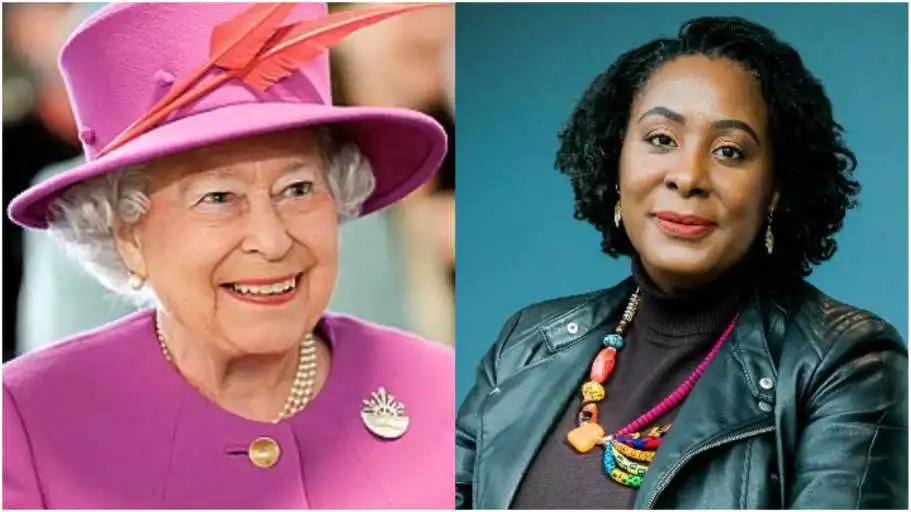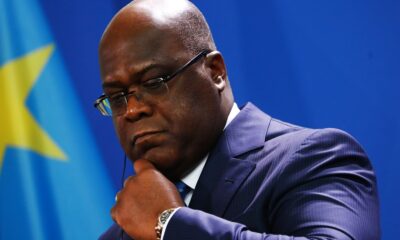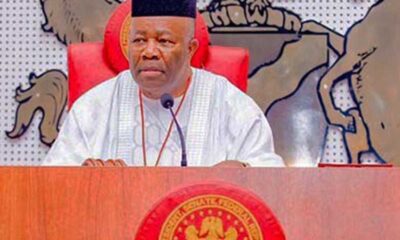Strictly Personal
Examining Uju Anya’s vitriol on Queen Elizabeth II by Festus Adedayo
Published
2 years agoon

Like a prude confronted with sexually explicit images, the world didn’t hide its shock at Nigerian-born American professor, Uju Anya’s negative comments last week on the late British monarch, Queen Elizabeth II. The world had waited with bated breath at manifest indications that Elizabeth’s last hours had come. Amid this apprehension, the associate professor of Applied Linguistics, Critical Sociolinguistics, and Critical Discourse at Carnegie Mellon University launched her salvo. It came in the form of a tweet that brimmed with bile and hate. She had tweeted: “I heard the chief monarch of a thieving, raping genocidal empire is finally dying. May her pain be excruciating”. It was a bazooka that upset and shook the world out of its sanctimony.
Billionaire Jeff Bezos, the world’s third richest man, had an immediate riposte for Anya. “This is someone supposedly working to make the world better? I don’t think so. Wow,” he had written. Not one to be cowed, Anya launched another diatribe at both Bezos and the now-confirmed-dead 96-year-old monarch. “If anyone expects me to express anything but disdain for the monarch who supervised a government that sponsored the genocide that massacred and displaced half my family and the consequences of which those alive today are still trying to overcome, you can keep wishing upon a star,” she tweeted. Uju was apparently making reference to the 1967–1970 Nigerian-Biafran war during which time the British Empire, supporting Nigeria, supplied arms and ammunition that helped Nigeria vanquish Biafra. About one million people reportedly died in the needless war. For Bezos, Anya had a harangue: “May everyone you and your merciless greed have harmed in this world remember you as fondly as I remember my colonizers”.
Uju is apparently an against-method academic. Born of a Nigerian/Trinidadian origin, her parents lived in Enugu, Nigeria and her father’s embrace of the African polygyny fractured the wedlock, necessitating her Trinidadian mother to flee to America with her siblings. A self-confessed lesbian, Uju got legally separated from her husband in 2017, even as she publicly announced her against-the-grain sexuality.
While Uju may be considered to have stepped off the borders of humanity by wishing another creation “excruciating death,” the facts of her grouse are in the public domain and need not be glossed over. An analysis of Anya’s tweet reveals three key elements in her accusations against the British Empire, viz theft, rape, and genocide support. There is none of these allegations that historical renditions, especially by African and Africanist scholars, have not levelled against British colonizers.
Apparently, because of her vested interest in Nigeria, Britain overtly supported Nigeria in the civil war and indeed supplied arms and ammunition to Nigeria. Thousands of Igbo had been killed in the 1966 pogrom with Britain, the immediate past suzerain, lifting no finger. The Harold Wilson government, through its lackey high commissioner in Lagos, David Hunt, was unapologetically against Biafra. As the war raged, 1.8 million refugees sprang up in Biafra, many of whom were living skeletons, kwashiorkor-stricken kids. Karl Jaggi, head of the Red Cross at the time, had estimated that about a million children were killed by hunger and bullets but Red Cross saved about half a million through its intervention.
With the help of BBC correspondent, Fredrick Forsyth, the terrifying pictures of skeleton-like children appeared on British TV and unsettled Britons, leading to a lack of appetite as those figures disrupted the flow of their dinner meals. The hitherto covered grim situations of the war, which Wilson had shielded from the British people’s view, sparked outrage and revealed Britain’s complicity in the genocidal war against the people of Nigeria. Queen Elizabeth was so powerful that if she indeed desired that the war should not be fought by both youthful soldiers, Yakubu Gowon and Emeka Odumegwu-Ojukwu, no blood would be shed by both parties.
Before Anya, Forsyth had revealed this complicity and connivance by Britain’s top echelon of power. He had written, “What is truly shameful is that this was not done by savages but aided and assisted at every stage by Oxbridge-educated British mandarins. Why? Did they love the corruption-riven, dictator-prone Nigeria? No. From start to finish, it was to cover up that the UK’s assessment of the Nigerian situation was an enormous judgmental screw-up. And worse, with neutrality and diplomacy from London, it could all have been avoided”. The truth is that, if Britain and her monarchy had insisted that the Aburi Accord, struck by the two leaders in Ghana, be observed to the letter, there would not have been the bloodshed that eventually occurred.
Britain was stung by allegations of vicarious complicity in the multiple deaths. It became clear that it either did not seek an armistice between the warring countries or it failed in its peremptory bid to reconcile them. Dr Akanu Ibiam, former governor of the Eastern Region, disclaimed the Knight of British Empire (KBF) bestowed upon him by Queen Elizabeth in protest of the UK’s biased involvement in the war. To further show his protest, Ibiam reportedly renounced his English name, Francis. So many other people protested the British complicity in the deaths of the people who later became re-assimilated into Nigeria.
What in Harold Wilson and David Hunt’s actions showed that they did not mirror the mind of Queen Elizabeth and her desire for the deaths of a people who, a few years before then, were her subjects, under the British colonial umbrella? A people who had now taken on the new name of Biafra? If the debonair queen didn’t stop Wilson from supporting the war on Biafra, why does anybody want to spare her of history’s unkind jab for the colossal deaths during the Biafran war?
Facts of history do not see Britain and ipso facto, Queen Elizabeth, as benevolent but cruel conquistadors. Till today, Britain’s foundational roles in the socio-political woes Nigeria currently faces have not ceased from jutting out of remembrancers’ lips. The 1914 amalgamation was done by Britain for the business pleasure of the empire without any regard for the future of Nigeria. The Royal Niger Company, a mercantile company formed in 1879, was chartered by Britain in the 19th century for this purpose. It became part of the United Africa Company which was used for the purchase and formation of colonial Nigeria. Through the activities of the company, Britain fenced off Bismarck Germany from the acquisition of Nigeria and it enabled this colonial empire to establish firm control over the lower Niger.
In Kenya, Britain’s conquistador role was no less benumbing. Between 1952 – the year Queen Elizabeth ascended the throne – and 1960, a revolt of the Kikuyu tribe against British rule reigned. The war was fought over three issues – the expulsion of Kikuyu tenants from settler farms, white settlers taking over lands and Britain’s failure to ascribe political representation to Kenyans in their own land. In the uprising, 32 white settlers and about 200 British police, as well as soldiers were said to have been killed. More than 1,800 African civilians were also killed. The number of Mau Mau rebels killed was put at around 20,000. When Britain hunted and captured the leader of the uprising, Didan Kimathi on October 21, 1956, it signalled the beginning of the move to grant Kenya its independence. Kimathi was executed by hanging in the early hours of February 18, 1957, at the Kamiti Maximum Security Prison.
Many of the empires under British suzerainty will also remember Britain and the Queen with grim-laced hearts.
Thus, while we stricture Anya, we should not gloss over history. By our human convention and norm, Anya tripped over the borders. The convention is for us to beatify fellow residents of this human space who transit mortality for immortality and their earthly sins are forgiven them. Our laws are no less guilty as even criminals undergoing trial have their cases discontinued. But should we allow the dead to escape that easily?
Britain dealt unkindly with her empires like merchandise and forcefully and unjustly expropriated their natural endowments as mercantile do. In the process, many lives were lost and futures railroaded. While many of those Mephistophelean activities of Britain took place before Queen Elizabeth ascended the throne, as the monarch that the rest of the world has known in the last 70 years, she should be a recipient of the assets and cruelty of her recent forebears. Methinks this was what Anya tried to say but which, either due to her unbridled anger and lack of diplomatese, she failed to pad with niceties – as the world wanted. Attempts at suppressing the angst against the past, rather than placating offspring of those whose kindred blood was spilt by African rulers, in connivance with colonial authorities, have boomeranged. Treating them dismissively and dressing them in derogatory words like “dot in a circle” has led to the metastasis of the hate and curated angry characters like Anya and Nnamdi Kanu.
The culture of not speaking ill of the dead is ancient and perhaps spans the whole of humanity. Africa has carried this culture on its head, probably more pretentiously than the rest of the world. History has however not allowed us to close our eyes to the evils perpetrated around us, even by ancient African monarchies who are the precursors of the current kings. From Sunni Ali Ber, the first king of the Songhai Empire and 15th ruler of the Sunni dynasty who conducted a repressive policy against the scholars of Timbuktu; Askia the Great, emperor of the Songhai empire; Shaka the Zulu; Idris Alooma; Benhazin Bowelle of Dahomey; Menelik II; Mansa Musa of Mali and down to some of our ancient Alaafins of the old Oyo Empire, as well as their chiefs like the wicked Bashorun Gaa, Africa too does not have a sparse supply of despots. Today, we paper over these excesses in history, just as we are doing with the kings and queens of England.
The British monarchy and some monarchies in the world are realizing that modernity may make it hard for them to continually assert the fiery powers of their fiefdoms as they did in times past. This, I think, is the most enduring manifestation of the monarchy superintended over by Elizabeth II. Under Elizabeth as queen, though the monarchical power is huge and awesome, it was dressed in a ceremonial robe. The political power, on the outward, was then made to look like the decider of the destinies of Britain and its erstwhile colonies. This however does not remove the fact that the monarchy was an umpire of bloodshed and tears in colonial territories some centuries ago.
The realization of this wave shift in power was espoused by the author of the celebrated Yoruba classic, Igbi Aye Nyi – Life swivels like a wind – Chief T. A. A. Ladele. Written in 1978, Ladele, an Okeho, Oyo state-born history teacher at Durbar College, Oyo, and pioneer headmaster of Baptist School, Iwere-Ile, was one of Nigeria’s early writers. In, Igbi Aye Nyi, the 1920-born writer sought to teach us all about the ephemeral worth of political power and the un-enduring texture of raw brawn. Set in a town called Otolu at the outset of colonial incursion into Nigeria, Oba Bankarere, the Otolu king, in concert with his sons, inflicted huge terror on his subjects in his excessive wielding of power. He flaunted the wealth that accrued from power and defied all known societal norms. Two of Oba Bankarere’s subjects however rose to save the sanity of the traditional institution and the lives of the people. In the end, the colonial government waded in to curtail these excesses in a manner that rubbished the king and curtailed his outlaw sons.
That culture of defending the dead, even when we know their excesses while alive, is what the rest of the world seems to be espousing with Queen Elizabeth’s transition. While I agree that wishing evil on the living as Professor Anya did was not tidy enough and sounds very inhuman, I am not against her dwelling on the perceived soft landing for the genocide that Britain, under the Queen’s watch, gave the Nigerian war. By not treading this path of beatifying the dead, in spite of themselves, Professor Anya and travellers on her kind of boat have received flaks on their persons. Some even went to the extent of deploying Anya’s sexuality to attack her and a queer character said that because she tweets positive comments on LP’s presidential candidate, she epitomizes the negative character some online rats ascribe to the candidate. Yes, Africans cannot stand same-sex relationships, but the fact of our global existence is that the biology of some people is misdirected towards such sexuality, in spite of themselves. There are so many citizens of the globe who share our admirable opposite-sex biology but whose minds are as odious and repugnant as the sewer. So why beatify the latter and incinerate the former?
To my mind, the culture of beatifying the dead with a blanket of “a life well lived” is self-serving. Most of the time, we spread this omnibus blanket as a shawl on the disreputable lives lived by the dead simply because we all dread what the world would say when we too exit the world. This was aptly explained by the late Ilorin, Kwara state Dadakwada maestro, Odolaye Aremu, who sang that no one can predict who will be free of being drenched by rain that is yet to abate. He had expressed it in his lyrics: “Ojo ti nro ti o da, Olohun lo mo iye eni ti o pa”.
The way to go is to let whoever lives their lives miserably be apportioned strictures commensurate with their measly lives and those who live life as puritans be so accorded at their departure. We have taken this apportioning of blanket beatification on the dead to such an absurd level that it encourages evil doers to bask in the warmth of their evil broths. This does not discourage the living from evil. While it is nice to beatify Queen Elizabeth as it is being done all over the world for her recorded great footprints while alive, let non-conformists like Anya freely dwell on the misgivings they have about her too. They should not be made victims of unfavorable censoring or censure.
You may like
-


Air Peace, capitalism and national interest, By Dakuku Peterside
-


This is chaos, not governance, and we must stop it, By Tee Ngugi
-


Off we go again with public shows, humbug and clowning, By Jenerali Uliwengu
-


How patriarchy underpins gender violence today, By Tee Ngugi
-


Help! There’s a dangerous, secret plot to save the EAC from imminent death, By Charles Onyango-Obbo
-


How South Africa, US elections could shape Tshisekedi’s bread in Kinshasa, By Charles Onyango-Obbo
Strictly Personal
Air Peace, capitalism and national interest, By Dakuku Peterside
Published
1 day agoon
April 16, 2024
Nigerian corporate influence and that of the West continue to collide. The rationale is straightforward: whereas corporate activity in Europe and America is part of their larger local and foreign policy engagement, privately owned enterprises in Nigeria or commercial interests are not part of Nigeria’s foreign policy ecosystem, neither is there a strong culture of government support for privately owned enterprises’ expansion locally and internationally.
The relationship between Nigerian businesses and foreign policy is important to the national interest. When backing domestic Nigerian companies to compete on a worldwide scale, the government should see it as a lever to drive foreign policy, and national strategic interest, promote trade, enhance national security considerations, and minimize distortion in the domestic market as the foreign airlines were doing, boost GDP, create employment opportunities, and optimize corporate returns for the firms.
Admitted nations do not always interfere directly in their companies’ business and commercial dealings, and there are always exceptions. I can cite two areas of exception: military sales by companies because of their strategic implications and are, therefore, part of foreign and diplomatic policy and processes. The second is where the products or routes of a company have implications for foreign policy. Air Peace falls into the second category in the Lagos – London route.
Two events demonstrate an emerging trend that, if not checked, will disincentivize Nigerian firms from competing in the global marketplace. There are other notable examples, but I am using these two examples because they are very recent and ongoing, and they are typological representations of the need for Nigerian government backing and support for local companies that are playing in a very competitive international market dominated by big foreign companies whose governments are using all forms of foreign policies and diplomacy to support and sustain.
The first is Air Peace. It is the only Nigerian-owned aviation company playing globally and checkmating the dominance of foreign airlines. The most recent advance is the commencement of flights on the Lagos – London route. In Nigeria, foreign airlines are well-established and accustomed to a lack of rivalry, yet a free-market economy depends on the existence of competition. Nigeria has significantly larger airline profits per passenger than other comparable African nations. Insufficient competition has resulted in high ticket costs and poor service quality. It is precisely this jinx that Air Peace is attempting to break.
On March 30, 2024, Air Peace reciprocated the lopsided Bilateral Air Service Agreement, BASA, between Nigeria and the United Kingdom when the local airline began direct flight operations from Lagos to Gatwick Airport in London. This elicited several reactions from foreign airlines backed by their various sovereigns because of their strategic interest. A critical response is the commencement of a price war. Before the Air Peace entry, the price of international flight tickets on the Lagos-London route had soared to as much as N3.5 million for the economy ticket. However, after Air Peace introduced a return economy class ticket priced at N1.2 million, foreign carriers like British Airways, Virgin Atlantic, and Qatar Airways reduced their fares significantly to remain competitive.
In a price war, there is little the government can do. In an open-market competitive situation such as this, our government must not act in a manner that suggests it is antagonistic to foreign players and competitors. There must be an appearance of a level playing field. However, government owes Air Peace protection against foreign competitors backed by their home governments. This is in the overall interest of the Nigerian consumer of goods and services. Competition history in the airspace works where the Consumer Protection Authority in the host country is active. This is almost absent in Nigeria and it is a reason why foreign airlines have been arbitrary in pricing their tickets. Nigerian consumers are often at the mercy of these foreign firms who lack any vista of patriotism and are more inclined to protect the national interest of their governments and countries.
It would not be too much to expect Nigerian companies playing globally to benefit from the protection of the Nigerian government to limit influence peddling by foreign-owned companies. The success of Air Peace should enable a more competitive and sustainable market, allowing domestic players to grow their network and propel Nigeria to the forefront of international aviation.
The second is Proforce, a Nigerian-owned military hardware manufacturing firm active in Rwanda, Chad, Mali, Ghana, Niger, Burkina Faso, and South Sudan. Despite the growing capacity of Proforce in military hardware manufacturing, Nigeria entered two lopsided arrangements with two UAE firms to supply military equipment worth billions of dollars , respectively. Both deals are backed by the UAE government but executed by UAE firms.
These deals on a more extensive web are not unconnected with UAE’s national strategic interest. In pursuit of its strategic national interest, India is pushing Indian firms to supply military equipment to Nigeria. The Nigerian defence equipment market has seen weaker indigenous competitors driven out due to the combination of local manufacturers’ lack of competitive capacity and government patronage of Asian, European, and US firms in the defence equipment manufacturing sector. This is a misnomer and needs to be corrected.
Not only should our government be the primary customer of this firm if its products meet international standards, but it should also support and protect it from the harsh competitive realities of a challenging but strategic market directly linked to our national military procurement ecosystem. The ability to produce military hardware locally is significant to our defence strategy.
This firm and similar companies playing in this strategic defence area must be considered strategic and have a considerable place in Nigeria’s foreign policy calculations. Protecting Nigeria’s interests is the primary reason for our engagement in global diplomacy. The government must deliberately balance national interest with capacity and competence in military hardware purchases. It will not be too much to ask these foreign firms to partner with local companies so we can embed the technology transfer advantages.
Our government must create an environment that enables our local companies to compete globally and ply their trades in various countries. It should be part of the government’s overall economic, strategic growth agenda to identify areas or sectors in which Nigerian companies have a competitive advantage, especially in the sub-region and across Africa and support the companies in these sectors to advance and grow to dominate in the African region with a view to competing globally. Government support in the form of incentives such as competitive grants ,tax credit for consumers ,low-interest capital, patronage, G2G business, operational support, and diplomatic lobbying, amongst others, will alter the competitive landscape. Governments and key government agencies in the west retain the services of lobbying firms in pursuit of its strategic interest.
Nigerian firms’ competitiveness on a global scale can only be enhanced by the support of the Nigerian government. Foreign policy interests should be a key driver of Nigerian trade agreements. How does the Nigerian government support private companies to grow and compete globally? Is it intentionally mapping out growth areas and creating opportunities for Nigerian firms to maximize their potential? Is the government at the domestic level removing bottlenecks and impediments to private company growth, allowing a level playing field for these companies to compete with international companies?
Why is the government patronising foreign firms against local firms if their products are of similar value? Why are Nigerian consumers left to the hands of international companies in some sectors without the government actively supporting the growth of local firms to compete in those sectors? These questions merit honest answers. Nigerian national interest must be the driving factor for our foreign policies, which must cover the private sector, just as is the case with most developed countries. The new global capitalism is not a product of accident or chance; the government has choreographed and shaped it by using foreign policies to support and protect local firms competing globally. Nigeria must learn to do the same to build a strong economy with more jobs.
Strictly Personal
This is chaos, not governance, and we must stop it, By Tee Ngugi
Published
1 week agoon
April 10, 2024
The following are stories that have dominated mainstream media in recent times. Fake fertiliser and attempts by powerful politicians to kill the story. A nation of bribes, government ministries and corporations where the vice is so routine that it has the semblance of policy. Irregular spending of billions in Nairobi County.
Billions are spent in all countries on domestic and foreign travel. Grabbing of land belonging to state corporations, was a scam reminiscent of the Kanu era when even public toilets would be grabbed. Crisis in the health and education sectors.
Tribalism in hiring for state jobs. Return of construction in riparian lands and natural waterways. Relocation of major businesses because of high cost of power and heavy taxation. A tax regime that is so punitive, it squeezes life out of small businesses. Etc, ad nauseam.
To be fair, these stories of thievery, mismanagement, negligence, incompetence and greed have been present in all administrations since independence.
However, instead of the cynically-named “mama mboga” government reversing this gradual slide towards state failure, it is fuelling it.
Alternately, it’s campaigning for 2027 or gallivanting all over the world, evoking the legend of Emperor Nero playing the violin as Rome burned.
A government is run based on strict adherence to policies and laws. It appoints the most competent personnel, irrespective of tribe, to run efficient departments which have clear-cut goals.
It aligns education to its national vision. Its strategies to achieve food security should be driven by the best brains and guided by innovative policies. It enacts policies that attract investment and incentivize building of businesses. It treats any kind of thievery or negligence as sabotage.
Government is not a political party. Government officials should have nothing to do with political party matters. They should be so engaged in their government duties that they literally would not have time for party issues. Government jobs should not be used to reward girlfriends and cronies.
Government is exhausting work undertaken because of a passion to transform lives, not for the trappings of power. Government is not endless campaigning to win the next election. To his credit, Mwai Kibaki left party matters alone until he had to run for re-election.
We have corrupted the meaning of government. We have parliamentarians beholden to their tribes, not to ideas.
We have incompetent and corrupt judges. We have a civil service where you bribe to be served. Police take bribes to allow death traps on our roads. We have urban planners who plan nothing except how to line their pockets. We have regulatory agencies that regulate nothing, including the intake of their fat stomachs.
We have advisers who advise on which tenders should go to whom. There is no central organising ethos at the heart of government. There is no sense of national purpose. We have flurries of national activities, policies, legislation, appointments which don’t lead to meaningful growth. We just run on the same spot.
Tee Ngugi is a Nairobi-based political commentator
EDITOR’S PICK


African Guarantee Fund partners Nordic Development Fund to launch green finance in Nigeria
The African Guarantee Fund (AGF) has teamed up with the Nordic Development Fund (NDF) to launch a green finance fund...


Ethiopia’s Lemma, Kenya’s Obiri give Africa double podium finish at Boston Marathon
Ethiopia’s long distance runner, Sisay Lemma, and Kenyan female marathon sensation, Hellen Obiri, teamed up to give Africa a double...


Davido’s ‘Unavailable’ achieves milestone with 100 million views on YouTube, Spotify
Nigeria’s Afrobeats sensation, David Adeleke, popularly known as Davido, has landed another milestone after his hit single, “Unavailable’, surpassed 100...


Zambia: Many feared injured as UPND, PF supporters clash in court
An unspecified number of people have been reported injured following a clash between supporters of Zambia’s ruling party, the United...


Investors’ wealth drops by $968 million on Nairobi Securities Exchange
In the last two weeks, investors at the Nairobi Securities Exchange (NSE) have taken profits, which has reduced investor wealth...


IMF predicts Nigeria’s inflation to drop to 18% by 2026
The International Monetary Fund (IMF) has predicted that inflation rate in Nigeria will drop to 23 per cent in 2025...


Air Peace, capitalism and national interest, By Dakuku Peterside
Nigerian corporate influence and that of the West continue to collide. The rationale is straightforward: whereas corporate activity in Europe...


Cameroon opens museum dedicated to oldest, influential kingdoms
The Cameroonian government has inaugurated a historical museum which is dedicated to honouring its oldest and most influential kingdoms. Known...


South Africa’s crypto firm VALR gets licence to operate as asset service provider
South African leading cryptocurrency exchange trading firm, VALR, has been granted both Category I and Category II licence by the...


Botswana sprint star Letsile Tebogo speaks of ambition to match Usain Bolt as world’s greatest
Botswana sprint star, Letsile Tebogo, has talked of his ambition to match his idol, Usain Bolt, with the upcoming Paris...
Trending
-

 Politics1 day ago
Politics1 day agoNigeria: Senate President wants police rid of bad officers
-

 Sports1 day ago
Sports1 day agoBotswana sprint star Letsile Tebogo speaks of ambition to match Usain Bolt as world’s greatest
-

 Tech1 day ago
Tech1 day agoSouth Africa’s crypto firm VALR gets licence to operate as asset service provider
-

 Metro1 day ago
Metro1 day agoTanzania, Rwanda others recall Johnson & Johnson children’s cough syrup


